Japan supports creating employment of Syrian Refugees in Jordan
09.08.2017
UNIDO launches technical training on agriculture and food processing through an opening ceremony in Kharja/Irbid.
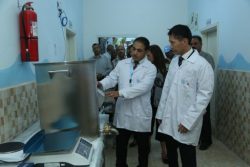
Briefing on equipment for technical training to Mr. Yoshida
Irbid/ Jordan, 6 August, 2017
Technical training on agriculture and food processing, under the UNIDO project titled “Creating employment and improving food security in the host communities of Syrian Refugees in the Northern and Central Badia in Jordan”, was officially launched through a ceremony at the charity association in Kharja/Irbid on 6 August, 2017.
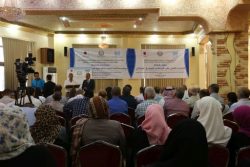
opening ceremony
Among distinguished guests that attended: His Excellency Mr. Norimasa Yoshida, the head of cooperation of Embassy of Japan to Jordan, Ms. Sulafa Mdanat, UNIDO country representative in Jordan and His Excellency Eng. Ali Abu Nukta, Director of Agriculture in Irbid.
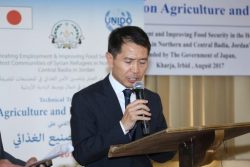
Mr. Norimasa Yoshida, the head of cooperation of Embassy of Japan to Jordan
Mr. Norimasa Yoshida emphasized in his speech that the fund from Japan was beneficial for the capacity building of the host communities in Jordan that were affected by the Syrian crisis and stressed the continuity of funding for such projects to improve and enhance the livelihood for these communities.
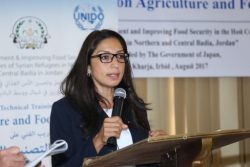
Ms. Sulafa Mdanat, UNIDO country representative in Jordan
Ms. Sulafa Mdanat stated the UNIDO’s mandate which is reflected in the Sustainable Development Goal number 9 (SDG 9) focusing on building resilient infrastructure, promoting inclusive and sustainable industrialization and fostering innovation.
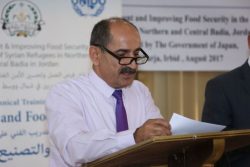
Eng. Ali Abu Nukta, Director of Agriculture in Irbid
Eng. Ali Abu Nokta expressed his gratitude to UNIDO as well as the Government of Japan for their generous contribution to this project.
In cooperation with the Ministry of Agriculture, the project will conduct the training for 500 local farmers and producers out of whom up to 30% could be Syrian refugees. The training will address and meet the need of beneficiaries regarding the targeted crops of pomegranate, tomato, and herbal and aromatic medicinal plants and roll out at 12 training locations in 3 governorates till the middle of September 2017.
Related Links
- Ethiopia Coffee Seminar - ONLINE (4/25)
- Jordan Dead Sea Cosmetics Seminar
- Event Report : UNIDO-Japan Cooperation - Mitigating the Impacts of COVID-19 through Techn…
- UNIDO-Japan Cooperation: Mitigating the Impacts of COVID-19 through Technology Transfer …
- Japan continues to support UNIDO’s activities in Africa

